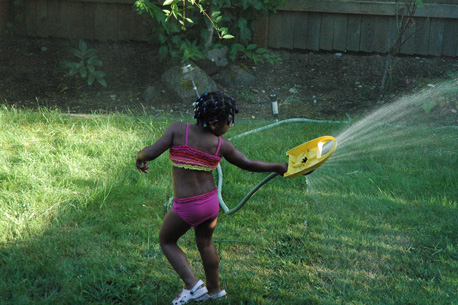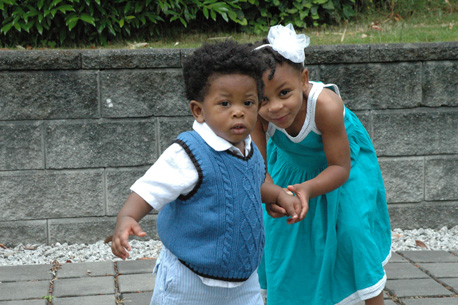
We met our daughter for the first time in an Intensive Care Unit. She was four days old, and a healthy 6.5 lb baby girl who was getting preventative antibiotics. When the nurse placed her into my arms, she was wrapped in a purple hand-knit blanket and had an orange bow stuck to her head. She was the prettiest baby I had ever seen and I wrapped my body around her and told her that we’d been looking for her and trying to get to her for so long, but that we were here now and it was all going to be okay.
I did all of this, I said all of this, while a handful of nurses and social workers watched. These people were strangers to me and my husband but they’d been caring for our daughter in those crucially important first few days of her life. They had grown to care about her and to hope that a good family would come for her soon. They were pleased we were there and encouraged us, but they were WATCHING. They were evaluating us and forming opinions, hopefully positive, about our family.
But, I have a confession; I’m not an appropriate crier. You say the words newborn baby to my mother and she’ll probably burst into tears right then and there. You tell me that my dog just got run over by a truck and I’d probably say something like oh, alright and walk away. That doesn’t mean that I am not sad. I will travel deep inside my head. I will think about this. I will imagine how it all happened and at some point I will cry and cry and cry. But probably not in front of anyone. I don’t cry at sad movies, I don’t usually cry right away when I hear sad or happy news, and I didn’t cry when I met my daughter. Thinking about it now, I want to weep like a three year old who has misplaced her blanket at bedtime, but there were no tears that day. And it was weird. It felt weird to me then and I’m certain it felt weird to our audience. What kind of mother doesn’t cry the day she meets her newborn?
We went through this again with the recent adoption of our eleven-month-old son. Instead of four days of care, K had received eleven months of care. There had been eleven months of people loving this kid. Some of them I know about. Some of them I do not. The last two months he was in nursery care with the adoption agency and his foster parents became very attached. They were there when we met K for the first time along with a social worker we had never met and will never see again.
Then and during the week of transition that followed, I was busy thinking about what was happening, processing his every move, studying and learning him. I did not cry once.
His foster mother spent the week sobbing and sniffling in the corner while we played with K. She had done this exactly eighty-eight times before (!) but, as she said, that doesn’t make letting go any less painful. They were happy we were adopting him and she thought we were the ideal family. But she was protective. As the week wore on, we got to know each other. The transition was going very well. We bonded with our boy but also with the foster parents though I still wondered if, in their eyes, anyone could be good enough.
We’d been advised to stay home in the weeks following K’s arrival, but a week after we returned to Seattle we decided to go to our cabin. The list of reasons is long and we felt like K was doing so well and that this would be the best thing for him and our family in the longer-run. Word got back to the foster mother via email and, yes, the unthinkable happened. She accidently forwarded me a message criticizing our choice, saying we hadn’t “allowed him time to adjust” and outlining how this would be detrimental. The email had been meant for her husband. There it was. The ultimate judgment. Parenting test failed.
In the weeks that followed I felt the foster mother looking over my shoulder. I questioned my instinct. I wondered if what I was doing was good enough for K and if she would approve. I felt less like he was mine and more like I was taking care of him for someone else. As if the new white mother of a black one year old boy needed more pressure.
Then I would scold myself for feeling this way. My experienced-parent, rational voice would say, of course I am right, I am his mother, but the self-doubt was there whether I acknowledged it or not. I tried to remind myself that all we could do was to keep going, continuing, and trying to make the best decisions for our family.
The other day, while I was watching J and K roll around in the grass, I had a hard time convincing myself that he hadn’t been with us since his birth. He’s brought the family into a perfect balance, a natural symmetry. Sometimes, when he melts down at the end of an over-scheduled day or I put him in front of a baby video so I can take a shower, I hear the foster mother’s disapproval. But I’ve learned that the more baby kisses, loves and hugs I receive, the quieter the foster mother in my head becomes. Pretty soon, I suspect she’ll develop a terrible case of laryngitis and be silenced forever. When that happens, you can be sure that I won’t shed a single tear.
Only 41 days until Who in This Room: The Realities of Cancer, Fish, and Demolition comes out. The launch party is at Elliott Bay Books on October 2nd, mark your calendars!


 At the end of our first meeting with our eleven-month-old son, when we were all tired from intense emotions and two hours of solid play, our boy started walking around the room jabbering and touching his flat hands to his chest, turning them palms up, and shrugging his shoulders. There was a crowd of stuffed animals near the window and he spoke to them, vehemently, patting his chest then raising his palms. Sometimes it looked like he was clapping for himself. As if to say, how do you like me now? Look at me walk! Other times it was more of a question, like, what? Or what do you think?
At the end of our first meeting with our eleven-month-old son, when we were all tired from intense emotions and two hours of solid play, our boy started walking around the room jabbering and touching his flat hands to his chest, turning them palms up, and shrugging his shoulders. There was a crowd of stuffed animals near the window and he spoke to them, vehemently, patting his chest then raising his palms. Sometimes it looked like he was clapping for himself. As if to say, how do you like me now? Look at me walk! Other times it was more of a question, like, what? Or what do you think?
